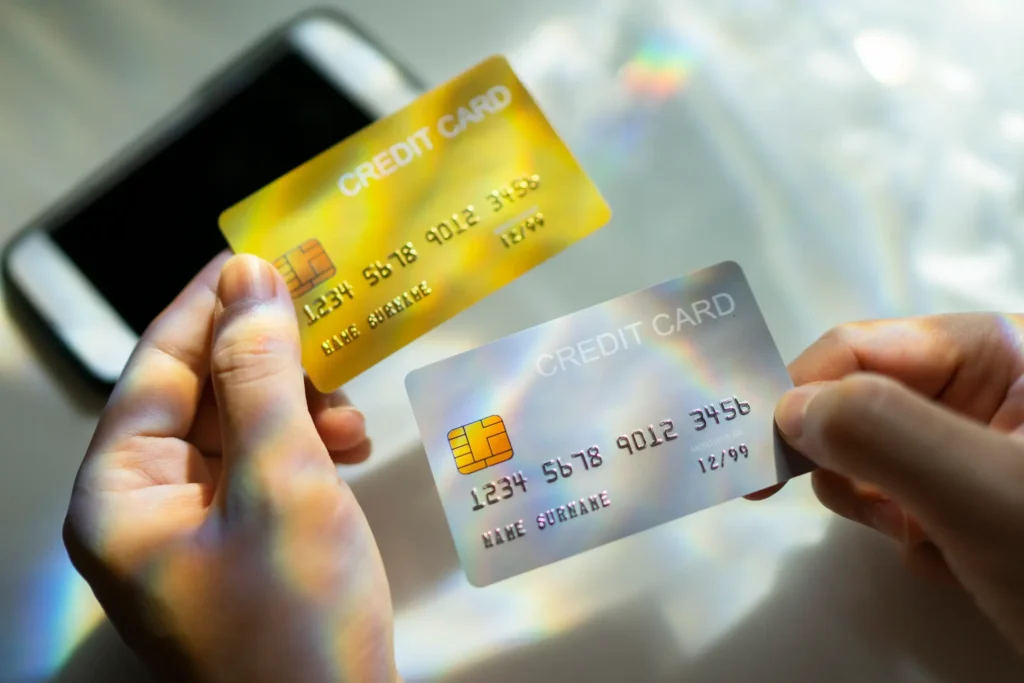A good credit card shows you handled your credit score well in the past, such as paying credit cards on time, but only when you know how to improve your credit score fast. There are too many ways to build a credit score, like paying bills on time, keeping your balance low, and avoiding too much debt. This will help you get lower interest rates and good financial deals.
There are many people who want to buy big things like a car, a house, but they can’t pay for them, so they want to get a big loan for that. A good credit score decides how much loan you are eligible for.
If you have no credit score or even a bad credit score, then the good news is that your credit score can be changed. If you made mistakes on building a credit score, then do not need to worry about that because with good choices and smart decisions, your credit score may improve.

Below are the steps. By following those 10 steps, you will know how to improve your credit score fast
- On-time payment.
Repayment history is a very important factor if you want to build credit in a short period, even without a credit card. According to most of the lenders, you can build a credit score in a fast way if you pay utility companies on time. Get current and remain current if you missed any of the payments.
All you have to do is ensure that you have enough funds in your account to pay your bills. Payment that is over 30 days past due will be recorded on your credit report for 7 years, and of course, will lower your credit score. To remember the deadline, make sure you configure automatic payments and put payment reminders within your accounts. However, as you catch up and continue to make on-time payments, the negative effect will gradually lessen.
- Don’t exceed the limit of your credit.
Your credit score can drop if you use too much of your credit. Experts said you should not use more than 30% of your whole credit limit. To achieve a higher credit score. Make sure you do not use too much credit
For instance, if you want to balance your credit limit and you have $1000, then try not to use more than $300. The remaining amount shows that you are capable enough to handle your credit responsibly
- Do not close your old accounts.
A larger credit history translates into a higher credit score. The whole age of your old accounts and the average age of all your accounts have a significant impact on the length of your credit history and 15% of your FICO score. If you want a longer credit history, make sure not to close your old accounts. Because it will increase your credit history. Another factor that affects your credit score is when you don’t utilize your cards
- Improve the variety of cards.
It is prefered by banker if you manage more then one credit cards responsibly it is generally a best idea to own different variety of cards and installment loans from which you do payments on time, such as student loan, car loan and housing. as an example, if you have 2 credit cards, a house loan, and an auto loan, will have a greater credit mix as compared to only one credit card.
- Limit new applications for cards.
Just apply for credit when it is necessary, if you want to avoid severe queries. Credit score models will see your recent credit activity as a hint that you require credit. If you apply for a lot of credit in a short period, creditors will think that you face financial difficulties.
The average age of your credit will decrease if you apply for a lot of credit because the lenders examine your credit report, which is also known as a hard check. So, improve your credit, avoid applying for credit that is not necessary, otherwise your credit may initially drop. Or this strategy may backfire and potentially reduce your credit scores.
- Become an authorized user.
A person who is added to a primary cardholder’s credit but is not responsible for the balance is called an authorized user. An authorized user now has their name linked to the credit card account and can take advantage of the cardholder’s low credit use, good credit, and on-time payment history.
Having a loved one take you as an authorized user on their credit card can immediately improve your credit score if you’re new to credit or trying to rebuild it. More advantages include extending the duration of your credit history, decreasing your credit utilization percentage, and building a history of on-time payments.
- Make sure your credit reports are free from errors.
Correct errors if you find any. Your credit score can be severely impacted by inaccurate credit report information if it relates to a serious problem like late payment or high credit balance. Keep an eye on your old credit card accounts if you have them and you aren’t using to be sure identity thieves aren’t using them.
Check frequently for mistakes and illegal conduct. Report problems right away. Look closely for any inaccurate information in your credit report from any of the three credit reporting companies. Contact both your lender and the credit reporting agency to dispute any missing or errors in your information - Keep your credit utilization low. Reducing the amount of credit you use could improve your credit score. Maintain small credit card and other revolving credit balances. A significant amount of outstanding debt can hurt your credit score.
- Pay Off Outstanding Debts. Try to pay off any past-due bills or collections accounts you may have, or work out a payment arrangement with your creditors. By removing a negative notation from your credit report, settling an outstanding debt might raise your credit score. A settled account may still show as “settled” rather than “paid in full,” but it’s still preferable to an open debt.
- Ask for a Credit Limit Increase. Get in touch with the credit card issuer to ask for a credit limit increase if you have a credit card with a solid payment history. Your credit score may rise as a result of lowering your credit usage ratio, which measures how much credit you’re using in comparison to your total credit limit. But don’t use the higher credit limit to spend more money; the limit should only go up, not the balance.

What is a credit score?
A credit score is a 3-digit figure that shows your responsibility for credit. It is managed by lenders or bankers, and determined by your credit history like how you manage your credit, creditors used this 3-digit called credit score to decide how much loan you are eligible for if credit score is good then you can get big loan, in simple words your eligibility to get loan is depend on your credit score
How credit score is calculated
Here are 5 important points which are used to calculate your credit score:
1. Payment History (35%): Do you make on-time bill payments?
2. Credit Utilization (30%): This measures how much of your credit is being used.
3. Length of Credit History (15%): This refers to the duration of your credit accounts.
4. Credit Mix (10%): Your range of credit (loans, credit cards, etc.).
5. New Credit (10%): The frequency of new credit account applications
How to check a credit score
Once a year, creditors provide their customers a report of their credit history, although, credit score is not included in your credit report. It will provide you with a clear picture of your yearly financial reports and highlight mistakes you made.
1. To obtain free weekly reports from all three bureaus, go to AnnualCreditReport.com
2. To track your credit score for free, use Experian, Credit Karma, or Credit Sesame.
3. Check your account tools; a lot of banks and credit cards provide free access to your credit score.
4. Your credit score won’t be impacted by these checks because they are soft inquiries.
5. You can identify mistakes and maintain the health of your credit with regular monitoring.
6. Every four months, set a reminder to switch between TransUnion, Equifax, and Experian.
7. Maintain a log of any disagreements or mistakes you resolve.
8. When accessing personal credit information, use safe devices.
At least once a year, it is a good time to check on your credit reports, but every three to four months is better for you to make sure you are secure from fraud, and make sure you did not make any mistakes.

Building credit with secured cards
Secured cards, in contrast to conventional (unsecured) cards, demand a security deposit, which is typically equal to your credit limit. For instance, your credit limit will be $300 if you deposit $300. Secured cards are safe and easily approved if you want to build credit with no credit or a low credit history.
Consistently acting responsibly can improve your credit score. Many issuers may offer to upgrade you to an unsecured card and return your deposit. Secured cards are a low-risk and safe way to establish credit.
What is the difference between FICO® score and credit score
Lenders frequently use FICO® Scores, which credit inquiries, credit usage, and payment history. These scores, ranging from 300 to 850, help lenders make credit decisions. Other agencies create non-FICO scores, such as Vantage Score, which may employ somewhat different weightings or criteria.
Bottom line
- The most important factor in your credit history is how you manage payments
- You can get credit by paying your monthly bills on time
- Find and fix any mistakes that lower your credit score
- Applying for too many applications results in a bad grade
- Make sure to keep your previous accounts open, the longer the credit history, the better the results
- Obtain authorization to use a friend or family member’s card if possible
FAQs
- 1. How much time will it take to build a credit score again?It mostly depends on how damaged your credit history is and which steps you take to build it again. More major credit events, such as bankruptcy, debt settlement, foreclosure, and loan default, will take longer to recover from, and negative items can stay on your credit reports for seven to ten years
- 2. How can I build a credit history for the first time?You can build your credit history by taking these steps if you start from scratch. Applying for a beginning credit card on your own, opening a credit-builder account, or asking a loved one to enroll you as an authorized user on their credit card are your options
- 3. Is my credit score affected by credit checks?There are two types of checks: soft checks and hard checks. Your credit score will be unaffected by a soft credit check. Creditors used this to determine your eligibility before applying. On the other hand, credit will be affected by a hard check because it will appear on your record when you apply for credit, and if too many in a short period of time, it may have a bad effect on your credit score and your prospects of being granted credit. This gives the impression that you are overly dependent on borrowing.
- 4. What are the benefits of a high credit score?If you have a high credit score, it will help you in a lot of things like . You can get a high loan if you have high credit . Lenders saw you as low-risk; they are likely to give you a bigger credit limit . It will obtain low interest rates and make borrowing affordable.
- 5. What if you have a low credit score?If the credit score is less than 6% yearly, you will be eligible to get loans your interest rates will be high, and you will get smaller credit limits A loan with a 6% annual percentage rate (APR), for instance, can be given to you with a 30% interest rate if your credit score is low. On the other hand, a credit card might give people with good credit a two-year 0% interest period, while those with poorer credit might only get six months.
- 6. Will my credit build by just paying rent?Although paying rent will not build my credit score. It wants a high credit score, then use services like Experian Boost®, which can connect to your bank account and report on-time rent payments.
